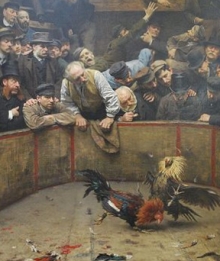Cockfighting, Congress, and Interstate Commerce
 Some convicted defendants in South Carolina are crying foul at the application of the federal Animal Welfare Act to criminally punish the promotion of cockfighting. The statute is said to be based in the power of Congress, found in article I, section 8 of the Constitution, to “regulate commerce . . . among the several States . . . .” Federal prosecutors successfully applied the statute at the trial level, and now the case is before a three-judge panel of the U.S. Court of Appeals for the 4th Circuit.
Some convicted defendants in South Carolina are crying foul at the application of the federal Animal Welfare Act to criminally punish the promotion of cockfighting. The statute is said to be based in the power of Congress, found in article I, section 8 of the Constitution, to “regulate commerce . . . among the several States . . . .” Federal prosecutors successfully applied the statute at the trial level, and now the case is before a three-judge panel of the U.S. Court of Appeals for the 4th Circuit.
The defendants (now appellants) argue that their conduct is not sufficiently related to interstate commerce, and is too local in character, to justify Congress’ exercise of its interstate commerce authority. Their contention in this regard is not about whether the promotion of cockfighting may be banned, but rather whether such conduct may be banned by Congress, which can only enact statutes that further its constitutionally enumerated powers. (Such conduct is largely prohibited, albeit with a lesser criminal sanction, by South Carolina law.) Their contention, moreover, appears not to be that the Animal Welfare Act as a whole is unconstitutional, but only that its application to their particular conduct exceeds Congress’s interstate commerce power.
The appellants’ arguments have a familiar ring to them.

